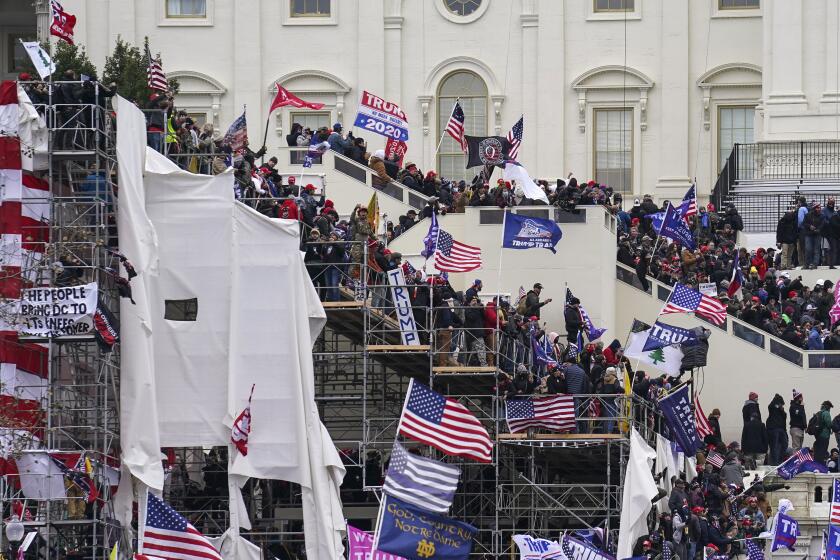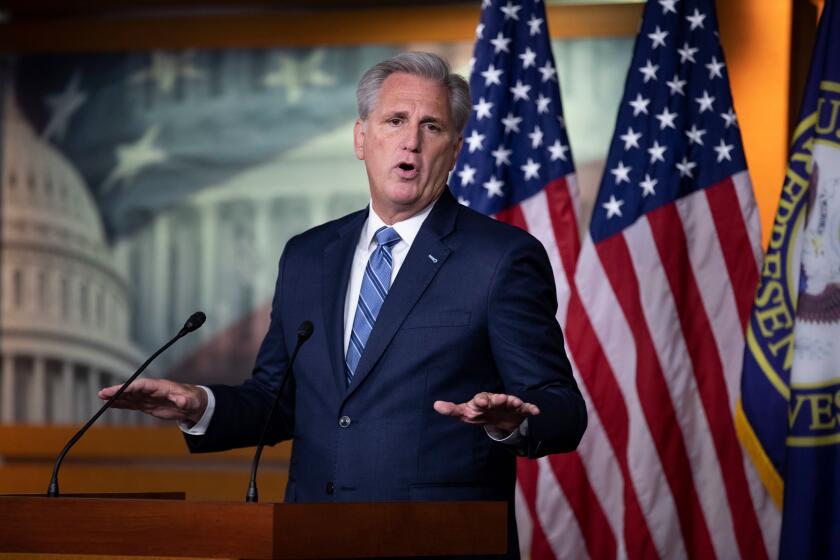Opinion: Donald Trump gave America a four-year civics lesson — the hard way
Sitting out front of our house earlier this week watching the sun set, I struck up a conversation with a few neighbors going through their afternoon routines — checking the mail, out for a run, that sort of thing.
We found ourselves discussing the mob attack on Congress and President Trump’s culpability — morally and criminally — as well as the Constitution’s phrasing of impeachment, whether Trump can indeed be convicted even after he has left office, whether the House impeachment was sufficient to render him ineligible for federal office under the 14th Amendment without a Senate conviction, and other assorted topics about which none of us knew diddly a mere month ago.
If there is any good to come from this atrocious administration, one neighbor suggested, it’s that he has brought the country into a much closer relationship with civics and the Constitution than existed before his political rise.
So, thanks, Trump?
Anti-government sentiment has long been with us (no surprise for a country founded in revolution), but political violence is its most dangerous expression.
Few would have ever muttered the word “emoluments” until Trump’s seemingly endless conflicts of interest brought it into the popular lexicon. “S corporations” were the domain of CPAs before investigative reporters were able to peel back some of the thick tarp Trump has laid over his finances and tax returns. “Checks and balances” was an abstract concept until Congress was forced to exercise its responsibility to hold Trump responsible for his abuses of power (and failed).
We’re discussing whether there are limits on presidential pardon power — including whether Trump can forgive himself for his own sins. And we have a better grasp of the difference between federal and state jurisdictions in criminal investigations of fraud, and that there is one bright-line limit to the potential pardon — it doesn’t apply to state investigations (good news!).
Similarly, more people now have a better grasp of the responsibilities of state election officials in overseeing votes. And after three proceedings we all know now how Supreme Court justices are vetted and appointed, as well as how the Senate majority leader can exercise unchecked power to control the confirmation process to his party’s advantage (sorry, Merrick Garland) — and how unconcerned top political figures are with their own hypocrisy.
If the Republicans are to survive as a political party, their leaders must start telling the truth — the first being that Biden won a free and fair election.
You can see where the interest has spiked by playing with Google Trends. Searches for “emoluments” jumped just after Trump’s inauguration in 2017, and again in October 2019 as House Democrats sought to sue him over alleged violations. So did searches for “presidential pardons” in the days after the 2020 election.
Ditto for “impeachment” as House hearings were underway in early 2019 over Trump’s efforts to pressure the Ukrainian government to dig up dirt on Joe Biden and his family, and “presidential pardon” as Trump’s election defeat became clear — and over the past week or so in the wake of Trump’s unleashed mob of supporters.
So, again, thanks Trump. At least you’ve given us new things to talk about.
Though in retrospect, I think we all would have been happier talking about the weather.
More to Read
A cure for the common opinion
Get thought-provoking perspectives with our weekly newsletter.
You may occasionally receive promotional content from the Los Angeles Times.













